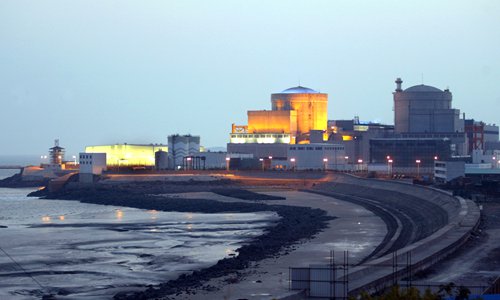FM says China's nuclear power plants operate normally, in line with intl standards; CNN criticized for selective reporting

Taishan Nuclear Power Plant in South China's Guangdong Province Photo: VCG
The Taishan Nuclear Power Plant in Taishan, South China's Guangdong Province meets technical requirements, and no abnormal radioactive indicators have been recorded, said the Chinese Foreign Ministry on Tuesday, in response to a US media report warning of an "imminent radioactive threat."
The US government was assessing a report of a leak at the Taishan Nuclear Power Plant made by Framatome, a subsidiary of French energy giant Électricité de France (EDF), in which the French company warned of an "imminent radioactive threat" at the plant, CNN reported on Monday.
"China's nuclear power plants have maintained a good operating record and no incidents affecting the environment or public health have occurred," Zhao Lijian, a spokesperson of the Ministry of Foreign Affairs, said during a routine press briefing on Tuesday.
Experts and observers criticized CNN for scrambling for innuendo to raise concerns over nuclear power security in China via selective reporting. In its report, CNN said that Framatome contacted the US government to obtain a waiver to share US technical assistance in resolving the issue at the Chinese nuclear power plant, but it didn't mention why or elaborate what the issue exactly was.
The Taishan plant is a joint venture between EDF and the China General Nuclear Power Group (CGN). However, CNN didn't even mention the fact that CGN is on a US "entity list" that prohibits US technology or data from being transferred to the group.
In October 2018, the US Department of Energy released the US Policy Framework on Civil Nuclear Cooperation with China, which sets out a number of restrictions on civil nuclear energy cooperation with China and forbids any nuclear power-related exports, including technologies, equipment and parts as well as materials, to CGN.
David Fishman, a researcher in China's energy field and energy regulation, said in his tweets on Monday that what Framatome is applying for is a relevant waiver for reasons of "operational safety."
According to Fishman's analysis, Framatome is likely applying for two reasons: The information they are preparing to transfer originated in the US, or they don't want to impact their business in the US by doing work with CGN without full transparency, or "probably both."
CNN also reported that the "Chinese safety authority was raising the acceptable limits for radiation detection" at the plant to avoid shutting the plant down, citing "a letter from the French company to the US Department of Energy obtained by CNN," but it didn't tell what the numbers are exactly, or whether Framatone mentioned it in its memo.
The allowable limits are usually set low by several orders of magnitude, Fishman said, so it is pretty hard to tell if it is anything to be concerned about.
"Without any quantifiable context, it's all speculative alarmism for clicks," he replied in a tweet.
China has always attached great importance to nuclear safety and has established a nuclear safety regulatory system in line with international standards, one that matches China's national conditions, Zhao said at the Tuesday press conference.
At the same time, the National Nuclear Safety Administration cooperates closely with nuclear safety regulatory authorities from other countries and maintains communication via existing multilateral mechanisms such as the Convention on Nuclear Safety of the International Atomic Energy Agency, Zhao stressed.
CGN also said in a statement on Sunday that, since entering commercial operation, the Taishan Nuclear Power Plant has operated the reactors strictly in compliance with business license documents and technical procedures.

